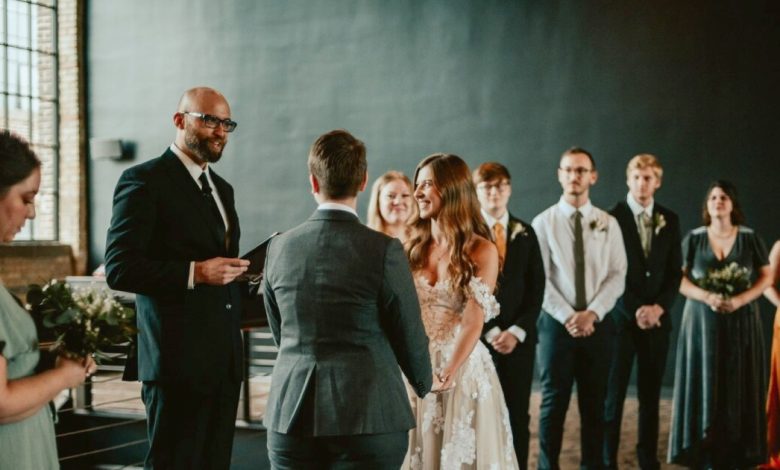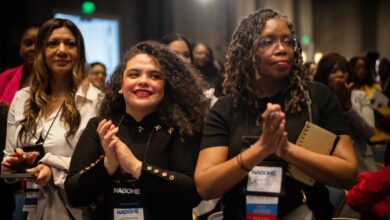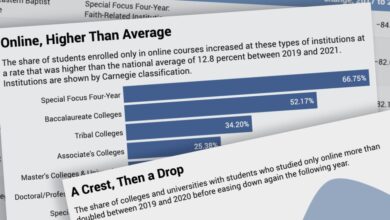This Professor Officiated at a Gay Wedding. Then He Lost His Job.

It was against this backdrop that, in December, Calvin’s provost received photos that appeared to show Kuilema officiating at a same-sex wedding. That information set off a chain of events that concluded, on April 18, with the university’s decision to not reappoint Kuilema to his untenured faculty position, a move that is likely to end his 14-year career at Calvin.
Disagreements over sexuality are hardly new at religiously affiliated colleges. Last month a professor at Oklahoma Christian University alleged that he had been fired for inviting a gay person to speak to his class. But Kuilema’s case highlights a quintessentially contemporary dilemma for Christian colleges, one that pits an institution’s conservative adherence to Scripture against the more progressive belief that people of faith should fight for marriage equality as a fundamental civil right. Those tensions are on full display at Calvin, where Kuilema’s case provoked a swift outcry from professors and staff members, who have urged the board to reappoint the professor.
Calvin University is a private college of about 3,300 students in Grand Rapids, Mich. Its board members are selected by the governing body of the Christian Reformed Church in North America, a Protestant Christian denomination of about 1,000 congregations. The university gained some national attention, in 2017, when Betsy DeVos, an alumna, took office as the U.S. education secretary. Calvin professors must sign the “Covenant for Faculty Members,” pledging to promote and defend the church’s core doctrines, known as confessions. Same-sex marriage remains a hotly debated topic within the church, but Calvin’s board has drawn a clear line. The university accepts as “settled and binding” the church’s position that sexual relations are prohibited outside of marriage, which is defined as a “covenantal union between a man and a woman.”
The case at Calvin has a turn-of-the-century feel, conjuring up the contentious debates that consumed the nation’s politics before the U.S. Supreme Court, in 2015, ruled that same-sex couples have the constitutional right to marry. Public opinion has shifted drastically on the issue. Seventy percent of Americans now say they support same-sex marriage, Gallup reported in 2021. At the same time, many LGBTQ+ people in the United States see their rights as increasingly under threat. State lawmakers have proposed a record number of bills that critics say would infringe on the rights of LGBTQ+ people. Florida attracted national attention with its recent enactment of a new law — branded by opponents as the “Don’t Say Gay” bill — that prohibits classroom instruction about sexual orientation in some elementary-school grades.
Calvin bills itself as a welcoming environment for all students, while forbidding sexual intimacy outside of heterosexual marriage. But the response to Kuilema’s case suggests that, at least for some faculty members, the university’s hard-line positions on sexuality are increasingly untenable and out of step with what some professors believe and practice in their own congregations. In a letter of support, more than 80 faculty members argued that many professors at Calvin had “concluded that there are ways for same-sex Christians to be faithful followers of Jesus that do not conform to the parameters” of the church’s stated position. Denying Kuilema’s reappointment, the professors said, “will send a chilling signal to our community that the university is retrenching to a narrow stance that will make many feel unwelcome.”
By that point, Kuilema had solid backing: His department, his dean, Calvin’s promotion and tenure committee, and the board’s academic-affairs committee all supported his appointment with tenure. The pending vote of the full board appeared to Kuilema to be a mere formality. The professor was particularly proud that he had made it this far without smoothing over any of his perceived rough edges, acknowledging to the board that he had views on gay rights that might rankle more conservative churchgoers.
“While I did poke the bear (just a little!), it was done in love and hopefully with appropriate humility,” Kuilema posted on Facebook. “I’ve repeatedly said that I don’t want to be tenured under false pretenses, and I do feel I was able to be honest with the board about my concerns, particularly around issues related to LGBTQ persons.”
Not so fast. In response to the post, the board set aside its decision on tenure, prompting the promotion and tenure committee, known as the Professional Status Committee, to discuss with Kuilema “questions triggered by his premature Facebook post,” according to a committee memo obtained by The Chronicle. Could the professor be trusted to engage with controversial issues, the committee was directed to ascertain, in a manner that “strengthens the church and the broader Christian community, and minimizes unnecessary and unhealthy consequences”?
Kuilema’s public positions on social justice had by now attracted conservative ire. In 2016 the nonprofit group Turning Point USA put Kuilema on its “Professor Watchlist,” lumping him together with faculty members whom the group labeled leftist propagandists. Kuilema had earned the group’s seal of ignominy after writing a column in Chimes, Calvin’s student newspaper, asserting that “those who deny white privilege functionally believe in white supremacy.”
While I did poke the bear (just a little!), it was done in love and hopefully with appropriate humility.
In September 2017, a few months before the board shelved its decision on Kuilema’s tenure, the professor had commented on an opinion column in Chimes that had expressed support for the so-called Nashville Statement. The statement, which was endorsed by 150 evangelical leaders, condemns same-sex marriage and “homosexual immorality.” Kuilema pushed back: “I think an honest reading of the Nashville Statement is that it not only condemns LGBTQ people, but those that support the view that God loves LGBTQ people just as they are.”
Acting on the board’s questions about Kuilema’s judgment, the Professional Status Committee asked the professor “if he thought his comments in Chimes about the Nashville Statement were helpful,” according to the memo. Kuilema said that he did not know but that he felt it was important for LGBTQ students at Calvin to see someone offer a countervailing view. (The committee, in its memo, cited Kuilema’s comment on the article as an example of writings that “sometimes lack awareness of audience in his tone.”)
On February 5, 2018, the board informed Kuilema that he had been denied tenure. Instead, he was placed in a kind of professional limbo, subject to renewable two-year appointments with the vague prospect that his tenure case could be revisited at some undefined point in the future. In a letter explaining the board’s decision, Craig H. Lubben, the board’s then chairman, cited an internal document, “Homosexuality and the Calvin College Community,” that declares “sexual abstinence is the biblically prescribed course of conduct for homosexual persons.”
Disagreements are acceptable and consistent with the tradition at Calvin, Lubben wrote, but “tone and strategy are very important” when disagreeing with a position of the church. Before granting Kuilema tenure, Lubben wrote, “the board needs more evidence that your communications, whether written or spoken, formal or informal, serve to strengthen the college and the broader Christian community in constructive and transparent ways.”
Devastated by the outcome, Kuilema emailed his colleagues on February 22, 2018, acknowledging the board’s concerns about his professional judgment. “I am deeply disappointed in this decision, and I disagree strongly with some of the reasoning it is based on, but I have chosen to accept it,” Kuilema wrote. “I have chosen to accept it both because it is in some respects true, and because I believe it offers me the best way to be involved in changes I hope to see the college make. I have, at times, allowed my anger at systems, policies, and decisions to become anger at the people in those systems, those making the decisions, the individuals enforcing those policies. In my anger, I have sinned. I am sorry for that, and I will do my best to work with those I have wronged to ask their forgiveness.”
More than two years later, in the fall of 2020, Kuilema heard from a queer staff member at Calvin, who had once been his student. She had a proposal for him to consider.
When Sweda and her partner, Annica Steen, decided to be married in a civil ceremony, Kuilema came readily to mind as an officiant. But the couple knew that doing so could put Kuilema at professional risk. “We know that this could potentially get you fired,” Sweda recalled them saying. The couple did not want Kuilema to answer right away, Sweda said, and Kuilema said he would need to consult with his church.
Before agreeing to officiate at the ceremony, Kuilema consulted with two pastors and the chair of council at Sherman Street Church, a Christian Reformed Church congregation where Kuilema is an elder. (The congregation, in a statement of inclusion, welcomes LGBTQ members to “preach, be married, have their children baptized, and fill all leadership roles.”) Kuilema also consulted with his department chair and program director at Calvin. All of those people supported his officiating at the ceremony, Kuilema said.
Kuilema is not ordained and has no formal seminary training. To officiate at the wedding, he obtained a free online certification that took about two minutes and allowed him to legally perform a civil marriage in the state of Michigan. Kuilema had, in his view, consulted university officials and authorities within his church before proceeding with a “personal” decision. “In my judgment,” Kuilema said, “this was something I was doing in my personal life and not as a Calvin faculty member.”
On October 15, 2021, Kuilema officiated at the ceremony at New Vintage Place, a secular event space with exposed brick walls on Grand Rapids’ West Side. Just a few weeks later, in early December, the Professional Status Committee affirmed the dean’s recommendation that Kuilema be reappointed to another untenured, two-year renewable appointment. But that process was upended on December 10, when someone shared photographs of the wedding with Noah Toly, the university’s provost. Toly would not disclose to The Chronicle who had provided the photos, other than to say that the person had done so “out of concern for institutional integrity, with great care for all involved, and with an understanding that the institution would be in a better position if we were not caught off-guard but were instead proactively engaging the matter with attention to due process.”
Once the provost received the evidence, Kuilema’s reappointment came under renewed scrutiny. Questioned about officiating at the ceremony, Kuilema confirmed he had done so. In a 17-page written response, complete with numerous footnotes, Kuilema laid out his rationale, offering for context a “Kuyperian understanding of sphere sovereignty” and a bit about “Zacharius Ursinus of the Heidelberg Catechism.” Behind that dense source material, however, Kuilema made a more straightforward argument. The professor told The Chronicle that he does not consider the church’s policies on same-sex marriage to be “confessional,” which are the most binding of precepts, and therefore he believes he is free to challenge those policies with reasoned arguments. “I also believe the church’s current position on these issues is wrong,” Kuilema said in an email, “and that I am ultimately responsible to God above all else.”
For Kuilema, this moment is for Christian colleges analogous to other flashpoints in history, when religious arguments have been used to uphold policies that, certainly to the modern eye, appear abhorrent and discriminatory. It was only in 2000, for example, that Bob Jones University, a fundamentalist Christian college, lifted a ban on interracial dating.
No one looks back at Bob Jones’s position against interracial dating and says that advanced the cause of Jesus Christ.
“These sorts of battles reflect very poorly on the faith,” Kuilema said. “No one looks back at Bob Jones’s position against interracial dating and says that advanced the cause of Jesus Christ.”
After Kuilema admitted to having officiated at the wedding, Calvin’s president, Michael K. Le Roy, directed the Professional Status Committee to evaluate Kuilema’s reappointment with the benefit of new information about his actions, documents show. For Kuilema, it was 2018 all over again; what had seemed to be the final phase of a personnel decision had been thrown into flux. It was around this same time that Toly, the provost, learned that a member of the wedding party was also a Calvin employee.
At the time of the ceremony, Sweda was a research associate at Calvin’s Center for Social Research, a survey and research hub that was created by the university’s sociology department in 1970. On January 25, Sweda was summoned to the provost’s office, questioned about her marriage, and told she was in violation of the staff handbook, she said. Two weeks later, on February 8, the university announced that the center would become independent of the university. There were financial reasons for the split, Sweda said. Principally, though, it appeared to Sweda that Calvin officials wanted to avoid the messiness of firing an employee over a same-sex marriage.
Wolters-Fredlund’s memo, which was first published last week by Chimes, reads at times as a tortured document. She praises Kuilema’s work and acknowledges that he has made strides in being more consultative. She expresses “deep regret” that her recommendation that Kuilema not be reappointed, in light of his actions, would deprive the university of a “passionate and faithful voice [that] has been a blessing to our community.” Ultimately, however, the Professional Status Committee concluded that Kuilema’s decisions “represented a failure to meet the expectations placed on him during this period.”
On April 18, Toly, the provost, informed Kuilema that his contract would conclude in August 2022, barring a successful appeal to the president. Asked about the decision, Toly told The Chronicle, “It is always painful and difficult to lose a colleague who is such a highly regarded teacher being loved by students, and by his department especially. And we are sad when anything comes between us and a member of our community who has contributed so much to the university.”
For Kuilema, the case crystallized something he might have already known. It was becoming untenable to serve his conscience and his university at the same time. “There comes a point,” he said, “where your personal integrity demands that you say, ‘No, I can’t, I can’t abide by that.’”
“Ultimately,” he added, “that line between personal and professional life couldn’t be maintained.”
Source link






